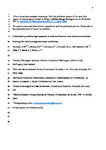Understanding coralline algal responses to ocean acidification: Meta‐analysis and synthesis
| dc.contributor.author | Cornwall, CE | |
| dc.contributor.author | Harvey, BP | |
| dc.contributor.author | Comeau, S | |
| dc.contributor.author | Cornwall, DL | |
| dc.contributor.author | Hall‐Spencer, JM | |
| dc.contributor.author | Peña, V | |
| dc.contributor.author | Wada, S | |
| dc.contributor.author | Porzio, L | |
| dc.date.accessioned | 2021-11-09T14:25:40Z | |
| dc.date.issued | 2021-10-24 | |
| dc.identifier.issn | 1354-1013 | |
| dc.identifier.issn | 1365-2486 | |
| dc.identifier.uri | http://hdl.handle.net/10026.1/18263 | |
| dc.description.abstract |
<jats:title>Abstract</jats:title><jats:p>Ocean acidification (OA) is a major threat to the persistence of biogenic reefs throughout the world's ocean. Coralline algae are comprised of high magnesium calcite and have long been considered one of the most susceptible taxa to the negative impacts of OA. We summarize these impacts and explore the causes of variability in coralline algal responses using a review/qualitative assessment of all relevant literature, meta‐analysis, quantitative assessment of critical responses, and a discussion of physiological mechanisms and directions for future research. We find that most coralline algae experienced reduced abundance, calcification rates, recruitment rates, and declines in pH within the site of calcification in laboratory experiments simulating OA or at naturally elevated CO<jats:sub>2</jats:sub> sites. There were no other consistent physiological responses of coralline algae to simulated OA (e.g., photo‐physiology, mineralogy, and survival). Calcification/growth was the most frequently measured parameters in coralline algal OA research, and our meta‐analyses revealed greater declines in seawater pH were associated with significant decreases in calcification in adults and similar but nonsignificant trends for juveniles. Adults from the family Mesophyllumaceae also tended to be more robust to OA, though there was insufficient data to test similar trends for juveniles. OA was the dominant driver in the majority of laboratory experiments where other local or global drivers were assessed. The interaction between OA and any other single driver was often additive, though factors that changed pH at the surface of coralline algae (light, water motion, epiphytes) acted antagonistically or synergistically with OA more than any other drivers. With advances in experimental design and methodological techniques, we now understand that the physiology of coralline algal calcification largely dictates their responses to OA. However, significant challenges still remain, including improving the geographic and life‐history spread of research effort and a need for holistic assessments of physiology.</jats:p> | |
| dc.format.extent | 362-374 | |
| dc.format.medium | Print-Electronic | |
| dc.language | en | |
| dc.language.iso | en | |
| dc.publisher | Wiley | |
| dc.subject | calcification | |
| dc.subject | CCA | |
| dc.subject | climate change | |
| dc.subject | coralline algae | |
| dc.subject | maerl | |
| dc.subject | meta-analysis | |
| dc.subject | ocean acidification | |
| dc.subject | pH | |
| dc.subject | Rhodoliths | |
| dc.title | Understanding coralline algal responses to ocean acidification: Meta‐analysis and synthesis | |
| dc.type | journal-article | |
| dc.type | Journal Article | |
| dc.type | Meta-Analysis | |
| dc.type | Review | |
| plymouth.author-url | https://www.webofscience.com/api/gateway?GWVersion=2&SrcApp=PARTNER_APP&SrcAuth=LinksAMR&KeyUT=WOS:000710220900001&DestLinkType=FullRecord&DestApp=ALL_WOS&UsrCustomerID=11bb513d99f797142bcfeffcc58ea008 | |
| plymouth.issue | 2 | |
| plymouth.volume | 28 | |
| plymouth.publication-status | Published | |
| plymouth.journal | Global Change Biology | |
| dc.identifier.doi | 10.1111/gcb.15899 | |
| plymouth.organisational-group | /Plymouth | |
| plymouth.organisational-group | /Plymouth/Faculty of Science and Engineering | |
| plymouth.organisational-group | /Plymouth/Faculty of Science and Engineering/School of Biological and Marine Sciences | |
| plymouth.organisational-group | /Plymouth/PRIMaRE Publications | |
| plymouth.organisational-group | /Plymouth/REF 2021 Researchers by UoA | |
| plymouth.organisational-group | /Plymouth/REF 2021 Researchers by UoA/UoA07 Earth Systems and Environmental Sciences | |
| plymouth.organisational-group | /Plymouth/Research Groups | |
| plymouth.organisational-group | /Plymouth/Research Groups/Marine Institute | |
| plymouth.organisational-group | /Plymouth/Users by role | |
| plymouth.organisational-group | /Plymouth/Users by role/Academics | |
| dc.publisher.place | England | |
| dcterms.dateAccepted | 2021-09-16 | |
| dc.rights.embargodate | 2022-10-24 | |
| dc.identifier.eissn | 1365-2486 | |
| dc.rights.embargoperiod | Not known | |
| rioxxterms.funder | Japan Society for the Promotion of Science | |
| rioxxterms.identifier.project | JSPS KAKENHI | |
| rioxxterms.versionofrecord | 10.1111/gcb.15899 | |
| rioxxterms.licenseref.uri | http://www.rioxx.net/licenses/all-rights-reserved | |
| rioxxterms.licenseref.startdate | 2021-10-24 | |
| rioxxterms.type | Journal Article/Review | |
| plymouth.funder | JSPS KAKENHI::Japan Society for the Promotion of Science |


